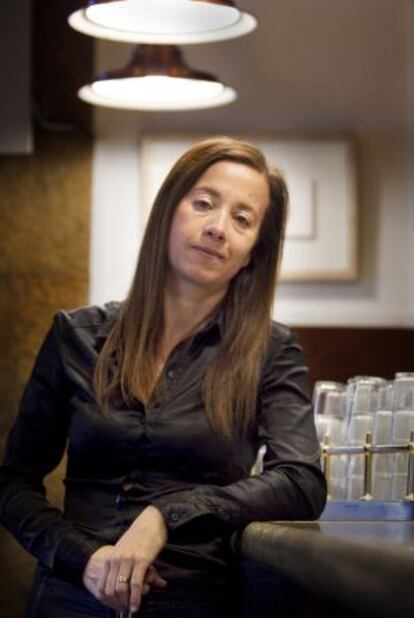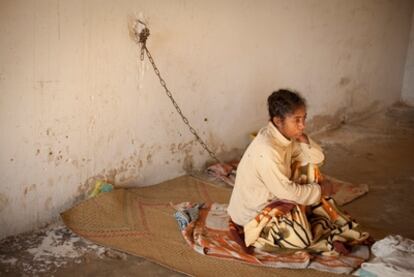"When I see people complaining about the crisis, I feel like laughing"
Belén Serrano's latest project focuses on blind children around the world
Children are the main subjects of her photographs, but people with disabilities, dependants, and in general anyone who has drawn the short straw in life also often figure. Artist Belén Serrano is especially sensitive to the inner light of the defenseless and the innocents. She sees the hidden treasure that most of us fail to perceive, but which she is intent on revealing.
"It's the good side of human beings, a purity with no duplicity that makes us all better people," says Serrano on a cold January morning as she eats at her favorite Madrid restaurant. The dishes she orders are simple and straightforward, like her own words and images.
For three years she has been traveling to the four corners of the world, absorbed in one project: to capture the dreams and realities of blind children of every race. To this end she has visited India, Albania, Vietnam, Madagascar and Morocco, and is now planning new trips to remote areas of Burkina Faso and Peru.
"Children's souls are not corrupt, they have nothing to conceal; unlike grown-ups, they show themselves the way they really are and express their emotions without shame," she says. It is the same with blind kids. Working with them, says Serrano, has been a tough but incredible experience. "They have a special kind of tenderness, and sharing with them has been a life-changing lesson."
The photographer says that through her subjects, she has learned to enjoy the simple things in life - a sunrise, a sunset, a clean home, a good moment. "When I see people complaining about the crisis, I feel like laughing," she jokes drily. "I believe I haven't bought a single thing since I got back."
Her grandfather was a violinist and a photographer, and he was the one who instilled a love of photography in Serrano. A decade ago, after raising her three children, she decided to go off to try to capture the souls of children and the dispossessed with her camera. Her projects were to a great extent self-funded, and each one appeared to be further and further away from Madrid, much to the dismay of her partner.
Miradas de ausencia (or, Gazes of absence) is the name of her current initiative, which has the backing of ONCE, Spain's blind persons' association. The aim is to produce a big show in Madrid in the spring, but somewhere in the open rather than inside a gallery.
"I am interested in photography as a witness to the reality of millions of children," she says. During her last trip, to Madagascar, Serrano ran into something she did not think existed any longer in the 21st century. In the neighborhood of Antoby, in the community of Tulear, she found a shelter where mentally ill patients considered dangerous were kept in chains. "They are cared for by the mpiandry, Lutheran pastors who feel that the best way to help them is to exorcize them in various ways, as they believe them to be possessed by the devil."
Serrano's photographs are hard, but they are always filled with poetry, because their gaze is clean. "I am more interested in people's hearts than in esthetics," she says.


Tu suscripción se está usando en otro dispositivo
¿Quieres añadir otro usuario a tu suscripción?
Si continúas leyendo en este dispositivo, no se podrá leer en el otro.
FlechaTu suscripción se está usando en otro dispositivo y solo puedes acceder a EL PAÍS desde un dispositivo a la vez.
Si quieres compartir tu cuenta, cambia tu suscripción a la modalidad Premium, así podrás añadir otro usuario. Cada uno accederá con su propia cuenta de email, lo que os permitirá personalizar vuestra experiencia en EL PAÍS.
¿Tienes una suscripción de empresa? Accede aquí para contratar más cuentas.
En el caso de no saber quién está usando tu cuenta, te recomendamos cambiar tu contraseña aquí.
Si decides continuar compartiendo tu cuenta, este mensaje se mostrará en tu dispositivo y en el de la otra persona que está usando tu cuenta de forma indefinida, afectando a tu experiencia de lectura. Puedes consultar aquí los términos y condiciones de la suscripción digital.








































